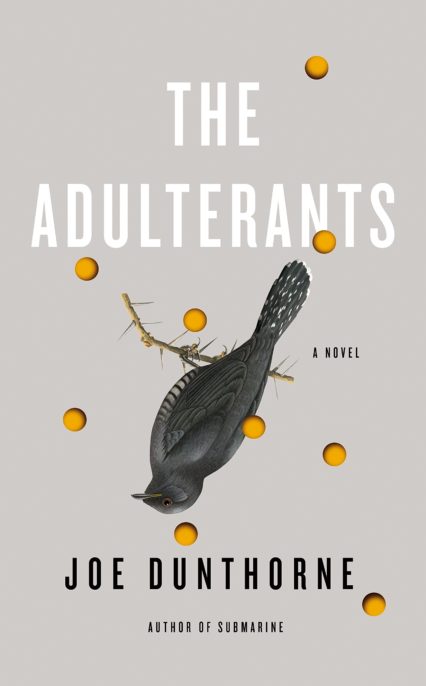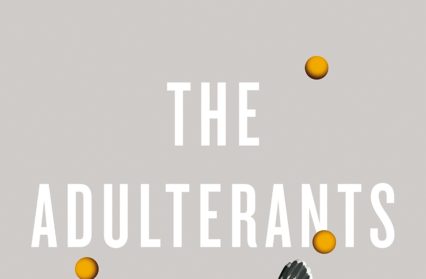Harper Dafforn reviews the new hilariously dark novel, The Adulterants by Joe Dunthorne, which highlights our cyber-generated egocentricity.
Adulterate – transitive verb: to corrupt, debase, or make impure by the addition of a foreign or inferior substance or element
- Merriam-Webster Dictionary

The Adulterants by Joe Dunthorne
Having an awareness of the illicit, unlisted inorganic substances that are almost certainly present in your fast food meal compromises the dining exper
ience. Despite not knowing exactly what they are, a sense of discomfort is instilled by the knowledge that they are inevitably there – that, despite labels, there is a malign artificiality to everything we consume. Joe Dunthorne’s latest novel renders brilliantly this sense of artificiality pervading a modern marriage.
The events surrounding the adultery and eventual departure of narrator Ray’s pregnant wife – Garthene, an understandably jaded ICU nurse – are recalled in a way which manages to recount minute details and Ray’s mordantly self-obsessed running commentary, but which seems unconcerned with amalgamating the abundant clues – the “adulterants” of the title – as to why Garthene left. Ray retrospectively treats his tragi-comic journey to anagnorisis with the same sense of farce that is the hallmark of a comic skit: the same tonal register is sustained up to and throughout the moment of crisis when he follows his wife to the apartment of her sympathetic colleague who has probably “never crossed a line in his whole life.” The closer he blunders to uncovering the truth, the more he seems a caricature of marital complacency, and a Gatsby-Esque inability to reconcile the past with the present:
“In all honesty, I didn’t really think she was having an affair, but by acting as though she was, I could allow us both to experience the texture of my melodramatic actions. That way we could enjoy discovering how madly I loved her, how my love was a sickness, how I was crazy from loneliness and jealousy, all without the time-consuming rigmarole of having her actually fuck around.”
Like his literary antecedents, dating back to the cuckolded, maladroit narrator of Petronius’ Satyricon, Ray’s point of view delivers a searing perspective into the disintegration-stroke-evolution of modern morals. As the dust jacket promises, The Adulterants captures so succinctly the ironic attitudes and penchants of the urban hipster-millennial everyman, from his vicarious excitement at having a gay friend, via his need to be exceptional (“ICU makes A&E look like a fucking wellness spa, I say”), to his simultaneous unwillingness to change his own life and supercilious contempt for the motivated and successful: “All these thirty-somethings who still hadn’t given up on their dreams, it was disgusting.” In fact, so astutely observed was the “semi-ironic” Zeitgeist of protracted adolescence that I found myself thinking about disconcertingly regular intervals, I have dated this guy. Furthermore, Ray and Garthene’s best friends and supporting couple, Lee and Marie, demonstrate the calamity that modern misconception
s about dialogue and negotiation being superior substitutes for simple emotional intuition can incur, as the open relationship instigated by Lee spirals into an emotional deadlock via catfishing and alcoholism. That their relationship remarkably endures this appears to be due to the fact that Marie’s adultery is with a man identical to Lee in many respects, whereas Garthene’s lover is Ray’s opposite in every way possible.
The members of Ray’s milieu pander to one another’s hypersensitivity, however, with the utmost empathy: as he ferments in “the stink of a grown man’s melancholy” in Ray and Garthene’s living room, Ray valiantly ensures that Lee is kept well away from anything “that might upset him with beauty or romance” despite misanthropically wishing that he himself could regress into the womb, or at least “a dark warm room with [his] wife”; later, when his own situation parallels Lee’s, Dave and Allen – the only functional couple in the novel – calmly coax him out of an attempt to contrive a drunken experiment with homosexuality at their apartment.
As well as being “a joyous diagnosis of our modern ills” (Paul Murray), the narrative of The Adulterants is technically sophisticated without being too self-consciously literary, following a five-part bildungsroman structure throughout which Ray hints at coming to terms with his recent separation by gradually ceasing to describe his solidarity with Garthene in the present tense; however, he keenly keeps to this habit at the exposition, when he conjectures at how accepting his wife would be of his failure to deflect Marie’s advances as he teeters on the periphery of passive adultery. After a brief foray into the home of Ray’s parents with echoes of Trimalchio’s banquet, the third part sees his passive involvement in the 2011 London Riots evolve into a Kafkaesque encounter with the technicalities of the justice system.
One of the most refreshing aspects of the novel was Dunthorne’s unabashed use of smartphones to further the narrative: the ability of social media to make or break a career, the inclusion and exclusion of emojis and ‘x’s to communicate degrees of affection, and the adulterous uses of messaging apps. The over-availability of information is the source of many of Ray’s irreverent remarks, such as “The duvet cover’s pattern was the flag of Japan, a country famous for its youth suicide”, and at one point, the availability of Garthene’s personal information online creates a potential impetus for tragedy. Whilst reading it, it was difficult not to conjecture that The Adulterants may well be referred to by future generations seeking a handbook to the sway the internet in its youth had over individual fates – if that thought is not itself all too characteristic of our cyber-generated egocentricity.
The Adulterants by Joe Dunthorne is available now.
Other Literature-based pieces by Harper Dafforn are available on Wales Arts Review.











